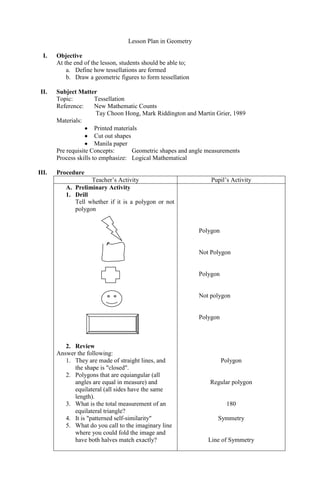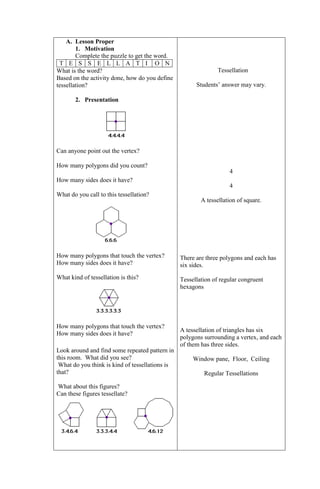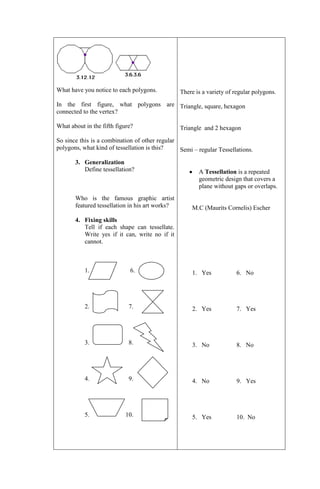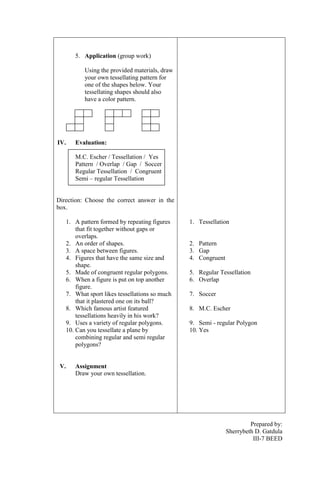Lesson plan in elementary geometry
- 1. Lesson Plan in Geometry I. II. III. Objective At the end of the lesson, students should be able to; a. Define how tessellations are formed b. Draw a geometric figures to form tessellation Subject Matter Topic: Tessellation Reference: New Mathematic Counts Tay Choon Hong, Mark Riddington and Martin Grier, 1989 Materials: Printed materials Cut out shapes Manila paper Pre requisite Concepts: Geometric shapes and angle measurements Process skills to emphasize: Logical Mathematical Procedure TeacherŌĆÖs Activity A. Preliminary Activity 1. Drill Tell whether if it is a polygon or not polygon PupilŌĆÖs Activity Polygon Not Polygon Polygon Not polygon Polygon 2. Review Answer the following: 1. They are made of straight lines, and the shape is "closed". 2. Polygons that are equiangular (all angles are equal in measure) and equilateral (all sides have the same length). 3. What is the total measurement of an equilateral triangle? 4. It is "patterned self-similarity" 5. What do you call to the imaginary line where you could fold the image and have both halves match exactly? Polygon Regular polygon 180 Symmetry Line of Symmetry
- 2. A. Lesson Proper 1. Motivation Complete the puzzle to get the word. T E S S E L L A T I O N What is the word? Based on the activity done, how do you define tessellation? Tessellation StudentsŌĆÖ answer may vary. 2. Presentation Can anyone point out the vertex? How many polygons did you count? 4 How many sides does it have? 4 What do you call to this tessellation? A tessellation of square. How many polygons that touch the vertex? How many sides does it have? There are three polygons and each has six sides. What kind of tessellation is this? Tessellation of regular congruent hexagons How many polygons that touch the vertex? How many sides does it have? Look around and find some repeated pattern in this room. What did you see? What do you think is kind of tessellations is that? What about this figures? Can these figures tessellate? A tessellation of triangles has six polygons surrounding a vertex, and each of them has three sides. Window pane, Floor, Ceiling Regular Tessellations
- 3. What have you notice to each polygons. There is a variety of regular polygons. In the first figure, what polygons are Triangle, square, hexagon connected to the vertex? What about in the fifth figure? Triangle and 2 hexagon So since this is a combination of other regular polygons, what kind of tessellation is this? Semi ŌĆō regular Tessellations. 3. Generalization Define tessellation? Who is the famous graphic artist featured tessellation in his art works? A Tessellation is a repeated geometric design that covers a plane without gaps or overlaps. M.C (Maurits Cornelis) Escher 4. Fixing skills Tell if each shape can tessellate. Write yes if it can, write no if it cannot. 1. 6. 1. Yes 6. No 2. 7. 2. Yes 7. Yes 3. 8. 3. No 8. No 4. 9. 4. No 9. Yes 5. 10. 5. Yes 10. No
- 4. 5. Application (group work) Using the provided materials, draw your own tessellating pattern for one of the shapes below. Your tessellating shapes should also have a color pattern. IV. Evaluation: M.C. Escher / Tessellation / Yes Pattern / Overlap / Gap / Soccer Regular Tessellation / Congruent Semi ŌĆō regular Tessellation Direction: Choose the correct answer in the box. 1. A pattern formed by repeating figures that fit together without gaps or overlaps. 2. An order of shapes. 3. A space between figures. 4. Figures that have the same size and shape. 5. Made of congruent regular polygons. 6. When a figure is put on top another figure. 7. What sport likes tessellations so much that it plastered one on its ball? 8. Which famous artist featured tessellations heavily in his work? 9. Uses a variety of regular polygons. 10. Can you tessellate a plane by combining regular and semi regular polygons? V. 1. Tessellation 2. Pattern 3. Gap 4. Congruent 5. Regular Tessellation 6. Overlap 7. Soccer 8. M.C. Escher 9. Semi - regular Polygon 10. Yes Assignment Draw your own tessellation. Prepared by: Sherrybeth D. Gatdula III-7 BEED




